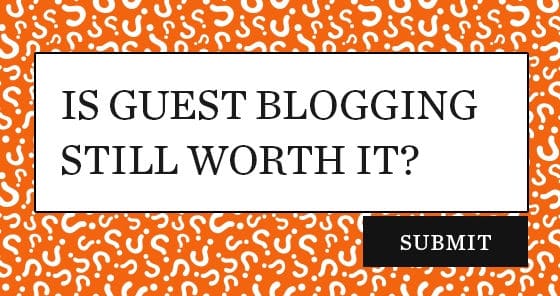In spite of the fact that Google’s Matt Cutts is such an esteemed figure as to have been immortalized in verse by online marketers (or maybe because of it?), yesterday he threw yet another SEO curveball our way.
In his blog post, entitled, “The Decay and Fall of Guest Blogging for SEO,” he makes the case for abandoning guest blogging for SEO purposes, calling the practice “spammy” and one with only “the barest trace of legitimate behavior.” Wow. That’s harsh, Matt.
But what’s even harsher are these statements of his: “Given how spammy it’s become, I’d expect Google’s webspam team to take a pretty dim view of guest blogging going forward,” and “So stick a fork in it: guest blogging is done; it’s just gotten too spammy.
I wouldn’t recommend relying on guest posting, guest blogging sites, or guest blogging SEO as a link building strategy.”
So is that it, then? Have the bad apples forever ruined guest blogging for the rest of us? Should we just give up on this practice altogether, so as not to risk Google’s wrath?
While it’s true that there are a multitude of spammy guest bloggers out there, there are also a multitude of people who use guest blogging as it was intended to be used – in an authentic, white-hat, above-board way. And it is important to note that Cutts does differentiate between the two, saying, “I’m not trying to throw the baby out with the bath water. There are still many good reasons to do some guest blogging.
Those reasons existed way before Google and they’ll continue into the future. And there are absolutely some fantastic, high-quality guest bloggers out there.”
So what he’s saying is that guest blogging as a way to get links is going the way of the dinosaur – but not guest blogging itself.
There are still many good reasons to guest blog. And there are still ways to do it right, without putting yourself at risk of being penalized by Google. Simply using no-follow links in your guest post is one way to take care of that. While guest blogs can no longer be used to add to the number of “votes” your site gets in the form of links from outside websites, they can still be used to build authority, credibility, and community online, to reach new audiences and increase exposure, to make connections with other experts in your industry, and for branding purposes – and no-follow links do those jobs just as well as do-follow links.
While guest blogging and outreach will still remain a vital part of any solid online marketing strategy, Cutts’s blog post yesterday does serve as a wake-up call to businesses. The two most important online marketing guidelines to keep in mind always have been and always will be to diversify your online marketing activities and to ensure you have fresh, high-quality, engaging content on your own website. By spreading your online marketing efforts out over social media, blogging, email, digital PR, SEO, and paid ads, you’ll never be overexposed in any one particular area, so changes in one can be easily compensated for in another. And making your own website the main focus of all your online marketing efforts, filling it with a steady stream of fresh, valuable, engaging content, will ensure that no matter what algorithm changes are unleashed, you are still in control of your company’s most important online platform – your website.




